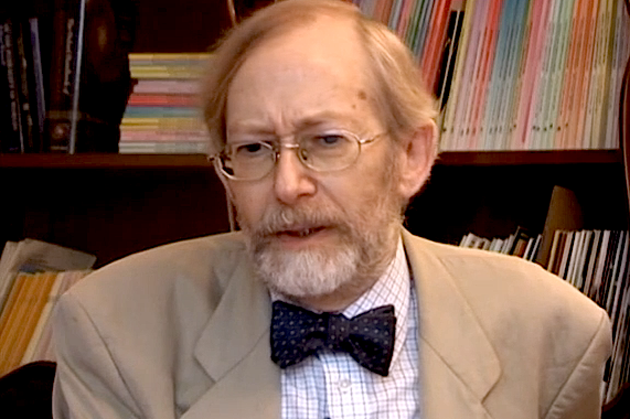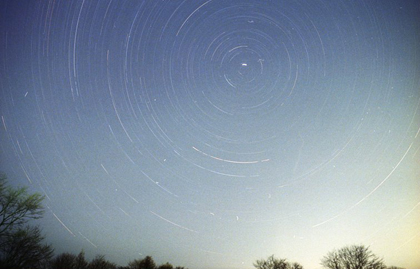“As Christians, we have enough tools to defend what we believe”
“The story of conflict is largely an invention of some late nineteenth century historians”, says scientist Dr Rodney Holder to Evangelical Focus. He analyzes the current scientific theories about the origin of the Universe and the influence of the New Atheism in our society.
MADRID · 13 JANUARY 2015 · 16:10 CET

Rodney Holder is the former Course Director of the Faraday Institute, he read mathematics at Trinity College in Oxford, has a PHD in astrophysics at Christ Church, Oxford and a degree in Theology. He was written many books about Faith and Science, the Big Bang Theory and the origins of the Universe.
In a interview with Evangelical Focus, Dr Holder talked about the main current debates between Theology and Cosmology, the origin of the Universe, the relationship between Faith and Science, an the relevance that some militant atheists scientists have gained in our society.
You can listen to the AUDIO interview at the bottom of this article.
Question. We usually hear that religion and science cannot be together. Are science and religion competing and contradictory explanations of the world?
Answer. No, very far from it. I think they are complementary explanations, they fit together very well. I think you get the idea of conflict if you take either of two positions. One is to say: 'the only way to read the early chapters of Genesis is literally thinking that the world was made in six days and six nights'; I think that is a mistake on biblical grounds, the Scriptures are a theological test, not a scientific test, so it is an important thing to say.
But, on the other hand, you can also get a conflict if you say, as some militant atheist has said, specially, Richard Dawkins in England: “Science is the only way to Truth, every question you can ask, it is a scientific question, with a scientific answer”, and that seems to be false for me too, because the really important questions, like 'how should we live?,' 'what is is the purpose of life?' are not scientific questions at all. And the scientific questions about the origin of the universe, the way the Earth works, or the Big bang, are scientific questions about the way God did it, but they are not in conflict with religious beliefs. In fact, they matched together very well.
The story of conflict is largely an invention of some late nineteenth century historians, particularly Draper and White that wrote books about it, but today the historians do not give any credit to that.

Q. One of your recent books is “Big bang, big God”, what can the Big bang tell us about the origin and the evolution of the universe?
A. The Big Bang Theory tells us that the Universe began some like 13.8 billions years ago, we are getting very accurate in that estimation. This gigantic explosion of energy, which gave rise, as the Universe expanded, to galaxies collapsed under gravity starts, forming, within the galaxies, starts evolving and the chemical elements of which we are made; and then, when the stars exploded, the Supernova, and those chemical elements being made available for the production of planets and untimely life and, subsequently generations of starts; it is, in a nutshell, the Big Bang Theory, and it is very, very well supported by evidences.
Now, theologically, it raises two very interesting issues: one is, that it seems to point to the Universe having a beginning, and that has been a very serious problem and difficulty for some atheist scientists: if there is a beginning, it might need God to make it.
There was a man in Cambridge, called Fred Hoyle, who was a very, very militant atheist, he broadcasted at BBC, saying religion was an illusion, and he hated the idea of Big Bang. He proposed an alternative theory to explain the expansion, by saying that maybe there was new matter that comes into the space, between the galaxies, and galaxies were formed, but the universe looks the same forever in the past, and forever into the future, that theory has been disproved.
Stephen Hawking, the Cambridge cosmologist, senses the same: he wants to avoid the idea of the Universe having a beginning, because he sees it as a theological problem. In reality, many theologians are very happy either way.
The Big Bang Theory, very interestingly, was originated by a roman catholic priest called Georges Lemaitre, who was a brilliant cosmologist, as well as a catholic priest, a deeply committed Christian, and not just a priest, but a member of a contemplative order. He did not make any theological case about it at all, in fact, he rather separated his Theology from his Science, he even intervened with the Pope in one occasion, trying to make an argument to demostrate that the Big Bang Theory shows that the Genesis was right.
There have always been these debates about the beginning, and there still are, it is a very hot topic. Currently, it seems certain that there is a beginning, and there is a American cosmologist, called Alexander Vilenkin, who has shown theorems that have proved that the Universe had a beginning.
MULTIVERSE VS. SUPERINTELLECT
Q. Modern cosmology talks a lot about 'Multiverse', the idea that there are infinite universes and the idea known as 'fine tuning'. It says that the natural laws are so special and perfect that allow the existence of a Universe with intelligent creatures as ourselves. Is a multiverse a better explanation than God for the design of the Universe?
A. According to the fine tuning, it seems that the Universe has been set up in a very, very special way, in order for us to exist. This relates to the various fundamental forces of nature: the force that holds the atom and nuclear together, the gravitational force, and the electromagnetic force. They need to find the degree of accuracy in order for the Universe to give rise to galaxies, to starts, and untimely to life.
That relates to the Big Bang Theory too: the Universe needed to be very, very smooth, it needed to be very close to a critical certain density near the beginning, otherwise, the Universe would either expand too fast, or nothing interesting would happen because it would have collapsed very, very quickly.
So this raises more questions, and, again, if you are a Christian it has a very easy and obvious explanation: God made the Universe with the intention of producing intelligent life, because God´s purpose is to bring about creatures who will be able to relate, to think about big questions, and to contemplate his Universe : “Heaven declares the glory of God”, we read in His Word.
One of the most significant of these “fine tunings” was discovered by Fred Hoyle, the atheist cosmologist: He realized that, because we are here, basic elements like carbon and oxygen, have to be manufactured inside the starts, that is the only place where these chemical elements can be made from its initial ingredients.
This takes an extraordinary coincidence with the way the forces of nature are set up. Of all the possible “Universes,” we need to be in one that allows the production of carbon needed for the creation of life, and that carbon needs to have a specific level of energy, in order to let us be here. Hoyle sent his predictions to his American colleagues, who discovered which was just the right level, and they won the Nobel Prize. Sadly, Hoyle did not get it, he should have won it.
But when he made this discovery, this militant atheist said: 'a superintellect has monkeyed with physics, as well as with chemistry and biology, and that there are no blind forces worth speaking about in nature.' This is a man who was saying that religion was an illusion at the BBC, and is now talking about a superintellect, a super mind behind the Universe; he could not quite bring himself to say God, but what do we mean by a super mind behind the Universe if it is not God? So there is very fascinating aspect of all this. Because it was science, pure scientific research, what brings Hoyle to talk about a super mind behind the Universe.
Then, of course, Science needs an alternative answer for the Universe, other than that God made it; and the most popular explanation right now, is the multiverse you mentioned before, the idea of a giant collection of universes. The interesting thing about the multiverse is that it is highly speculative, there is not evidence for a multiverse, there cannot be even in principle evidence of a multiverse, because we do not have in this Universe any matter of other universes, it seems a theory that is not scientific.
Atheists like Richard Dawkins say that we should only believe anything on the basis of evidence, and he believes in the multiverse, for which there is no evidence. So we are in an interesting area when it comes to Theology and Cosmology and there are new theories, like the String Theory,or the Higgs Bolsom, but there are not evidences, so we are in the world of speculation with these current theories too.
We need a new theory of Physics, to describe what happened in first small fraction of the second at the beginning. So there is a lot of interesting food for thought, for a dialogue between Science and Theology.

“IT IS FASHIONABLE TO ATTACK RELIGION”
Q. We are seeing many scientists writing books against the idea of God, do you think they do it just because it is “politically correct” or are they honest in their intentions?
A. I think there is a lot of truth in that: it is fashionable to attack religion. Richard Dawkins, has always done that, he has done it in his early books, but his early book were mostly about Science, they were very well written, they were brilliant and fascinated expositions, he is a very good communicator.
But there was always a little sign against religion. That has come to the front row now, and it is the main thing he seems to write about, he is very, very anti religion, specially in the 'God delusion'. And I find it quite hard to explain, Richard Dawkins is the one I am most familiar with, because as far as one can tell, he has a normal, very middle class English education: public school, where he would go to chapel, and all those kind of things, and, indeed, in some ways, he likes the tradition.
Three years ago, he participated in the anniversary of the King James Bible, he wanted to read the Song of Solomon, because, with the King James flavour, it is a wonderful love poem, and it is written in a beautiful Shakespearean English.
But I do not know from where his militancy against the real belief in God comes. I think it has grown since the attack of the Twin Towers in New York, when we see the rise of militant Islam, but Richard Dawkins places all believers in the same category: roman catholic nuns and Bin Landen, and that for me it is totally crazy. I cannot think in other way to describe it, it is completely bad.
In his early books, he was even equating catholic nuns to the sect that committed mass suicide in Guyana, and he also said that religion is responsible for all wars. How can you say that when you have lived in a Century where we have Stalin, Hitler or Pol Polt? What he says it is complete untrue. But in some ways, we are in the same side: he is against superstition, for example, and so am I, as Christians, we are against reading horoscopes and all that.
From an orthodox Christian belief, I think there is a massive evidence of the existence of God, and the much more detailed and interesting evidence comes from the life, death and resurrection of Jesus Christ, and people like Richard Dawkins simply do not seem prepared to look at that, which I think is a terrible shame.
Q. We talk at the beginning of the interview about the relationship between science and religion. Can science give any evidence for God's existence? If not, shouldn't we regard believe in God as irrational, a mere act of faith?
A. This is when I think evidence does comes in. There was one mistake in the way we have thought about evidence, and it was done by the Intelligent Design movement in United States. When they looked for gaps in the story told by Science, and specially about evolution, because it is very difficult and science, at the end, has given answers to those questions.
But when we look at the meta questions that bring us beyond Science, like: how can the Universe is comprehensible for us? Or, how can we do Science?, questions that puzzled Einstein, we know that God explained them, when He said that we have been made in His image, our minds matched with the Universe because of that. These argument shows that the best explanation for the existence of the Universe and its fine tuning, it is that there is God behind it.
And the particularities of our faith, we can back them up with the evidences of the Bible: the New Testament has bee analyzed to pieces, particularly in the last 300 years by important scholars, and we learn quite a lot from that. The evidences from the resurrection of Jesus are immensely powerful: the first evidence is in Corinthians chapter 15, where Paul detailed who were the people to whom Jesus first appeared, that is a solid evidence.
So I think we have a rock, and we have very solid evidences to believe and, indeed, Peter tells us we should defend what we believe, we can, because we have enough tools to do that.
Science cannot prove everything: it cannot prove there is a God, it cannot prove there is not a God. And of course the idea of God is caricatured by people like Dawkins, but we are talking about a super intellect, a super mind behind the creation of the Universe, our God and Father, and the Lord Jesus Christ, so the whole story stands together.
Published in: Evangelical Focus - science - “As Christians, we have enough tools to defend what we believe”
